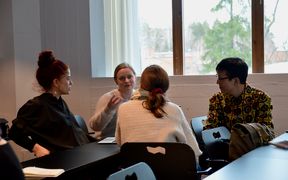How does psychological safety create the foundation for learning, innovation, and creativity?
Psychological safety can be approached through at least three different levels: psychosocial safety climate on organisational level, psychological safety in the immediate work community, and individual psychological safety. Psychological safety or unsafety is experienced in a group together with others, but ultimately the feeling of safety is an individual experience. Personal experiences, position, and identity influence the formation of the feeling of safety. When encountering others, people always bring their entire experiential world with them, which affects the experienced feelings of safety.
How does psychological safety support learning?
Research has examined the impact of psychological safety from the perspectives of performance, learning, wellbeing at work, and leadership practices. The results suggest that psychological safety supports success, especially in demanding and creative knowledge work in an increasingly complex world. It has been found to strengthen creativity, initiative, and learning, as well as improve team performance. Work engagement can also increase.
A master's thesis conducted at the University of Eastern Finland found that psychological safety has a positive effect on commitment to studies and better learning practices. Large group sizes and remote teaching was found to undermine psychological safety, while group work and discussions proved to be teaching methods that support safety. Psychological safety has been found to increase the quality of the learning experience and, according to a McKinsey report, lead to better decisions. A publication from the University of Tampere highlights, for example, the impact of funding models and steering methods on choices of leadership style, and thus on psychological safety.
While learning, it is crucial to have the opportunity to make mistakes and learn from them. Collaborative learning practices and a constructive discussion culture allow, for example, the safe review of homework. When information, perspectives, concerns, and ideas can be shared safely, even radically new ideas can be created. According to Edmondson, psychological safety should not be a goal in itself, but a means to enable other goals.
Can it be too safe?
Psychological safety has been criticized for possibly preventing raising and discussing important, especially controversial, topics. This kind of criticism has been raised for example in Kulttuuricocktail, at the University of Helsinki, and in the Living Arts Collective.
Edmondson emphasizes that a psychologically safe environment does not mean being polite at all costs. It is not a state where causing discomfort is avoided in order to preserve psychological safety. It is a state where one can boldly be oneself and express differing views, even on difficult topics. Studies also refer to 'voicing,' meaning the importance of expressing one's own opinions. It is important to respect and appreciate others, as well as accept others’ experiences even if one cannot understand them oneself. Different perspectives are dealt with constructively, and fear of embarrassment, humiliation, or rejection does not prevent learning and development.
Learning and making mistakes can be uncomfortable experiences. Feelings of shame are often associated with making mistakes. Exposing one’s vulnerabilities carries risks. However, it is easier to take these risks in a secure environment where negative consequences don’t need to be feared.
Internationality adds new dimensions to safety
Aalto University students represent 117 countries, and staff members come from 93 different countries. These numbers indicate a highly international community. How should internationality be considered in creating psychological safety and supporting seamless, interdisciplinary collaboration?
Cultural differences may affect the courage to challenge others' (or general) ideas. It is important to consider what effect, for example, the fear of losing face might have on whether one can talk about mistakes or try to correct shortcomings. Inappropriate behavior may be left unreported also if the permission to stay in Finland depends on whether the employment continues.
When there are wars and natural disasters in the world, it probably affects more people in an international community. The challenge is that it is not always known where colleagues or their families are originally from. There is therefore a need to get to know co-workers personally as well. The Finnish way of politely giving other people space to raise their problems if and when they want to, may seem to representatives of other cultures like no one cares and is interested in them during hard times. In addition to cultural differences, generational views may also differ.
Responsibility for psychological safety
Whose responsibility is psychological safety at universities then? As institutions, universities must make the framework of psychological safety clear to everyone. They can offer students and employees tools and support for increasing awareness, but the experience of safety is always formed in everyday encounters, where the university's institutional ability to influence is smaller.
Aalto's equality, diversity and inclusion officer Ida Salin emphasizes that the more power a person has, the more significant the responsibility for psychological safety becomes. Tools to contribute to psychological safety for those in positions of power, like professors, are traditional good leadership practices: listening, asking questions, being present, having empathy, and the ability to give and receive feedback.
It is essential to recognize one's own biases and tendencies, as well as one's position in creating safety. In many ways, psychological safety is intertwined with good communication skills, trust, and respect for others. Therefore, the right answer to the question at the beginning of the paragraph is: psychological safety is everyone's responsibility. Everyone has an important role in creating a safe space in daily encounters.
Teaching community and pedagogical reflection, support and training are vital for teachers' wellbeing
HowUTeach, teachers' wellbeing questionaire and self-reflection tool was piloted in Oasis of Radical Wellbeing initiative during academic year 2022-2023 and autumn term 2023.

References
Ayub, U., Yazdani, N. and Kanwal, F., 2022. Students’ learning behaviours and their perception about quality of learning experience: the mediating role of psychological safety. Asia Pacific Journal of Education, 42(3), pp.398-414.
Bradley, B. H., Postlethwaite, B. E., Klotz, A. C., Hamdani, M. R., & Brown, K. G. 2012. Reaping the Benefits of Task Conflict in Teams: The Critical Role of Team Psychological Safety Climate. Journal of Applied Psychology, 97(1), 151–158.
Edmondson, A.C. 2023. https://amycedmondson.com/psychological-safety/
Edmondson, A.C. & Bransby, D.P., 2023. Psychological safety comes of age: Observed themes in an established literature. Annual Review of Organizational Psychology and Organizational Behavior, 10, pp.55-78.
Edmondson, A. C. & Z. Lei, 2014. Psychological safety: The history, renaissance, and future of an interpersonal construct. Annual Review of Organizational Psychology and Organizational Behaviour 1:1, 23–43.
Frazier, M. L., Fainshmidt, S., Klinger, R. L., Pezeshkan, A., & Vracheva, V. 2017. Psychological Safety: A Meta‐Analytic Review and Extension. Personnel Psychology, 70(1), 113–165.
Gallo, A. 2023. What is psychological safety? Harvard Business Review, https://hbr.org/2023/02/what-is-psychological-safety, kts 28.11.2023.
Majuri, Julia. 2023. Psykologisen turvallisuuden tasot ja työhyvinvointiyhteydet: Henkilösuuntautunut tarkastelu. Tampereen yliopisto. Pro gradu.
Newman, A., Donohue, R., & Eva, N. 2017. Psychological safety: A systematic review of the literature. Human Resource Management Review, 27(3), 521–535.
Roussin, C. J., MacLean, T. L., & Rudolph, J. W. 2016. The Safety in Unsafe Teams: A Multilevel Approach to Team Psychological Safety. Journal of Management, 42(6), 1409–1433.
Sanner, B., & Bunderson, J. S. 2015. When feeling safe isn’t enough: Contextualizing models of safety and learning in teams. Organizational Psychology Review, 5(3), 224–243.
Suojanen, I. 2022. Onnellinen turvallisuus, Turvallista arkea etsimässä. Gaudeamus.
Wacklin, L. 2023. YLIOPISTO-OPISKELIJOIDEN KOETUN PSYKOLOGISEN TURVALLISUUDEN YHTEYS OPISKELEMISEEN JA OPPIMISEEN. Itä-Suomen yliopisto. Pro gradu.
https://erepo.uef.fi/handle/123456789/29715, kts 29.11.2023.
Related news

What drives success in the film and audiovisual industries? New research to support growth and competitiveness
Aalto University Department of Film is leading a €1.6 million Co-Innovation research project, SmartSuccessAV, funded by Business Finland. The project aims to gain new research-based knowledge on how success in the Film and AV industry is managed and how decision-making is structured as production, financing, and distribution structures change.
Support for students impacted by the crisis in Iran
The university supports and helps students in dealing with the crisis
Summer School Alum Story: Why diversity and inclusion matter – learnings from this summer
This summer’s course shows students that no organisation can afford to overlook its commitment to this topic, neither now nor in the future.Mind & Study - toolbox for being well in studies (3cr) coming up
Popular course "Mind & Study - toolbox for being well in studies" will be organized in Finnish, English and Swedish in the 3rd and 4th period!Related events at Aalto

Aalto Readers' Club
Join our dynamic book club at Aalto University!
Aalto Readers' Club
Join our dynamic book club at Aalto University!
Aalto Readers' Club
Join our dynamic book club at Aalto University!






